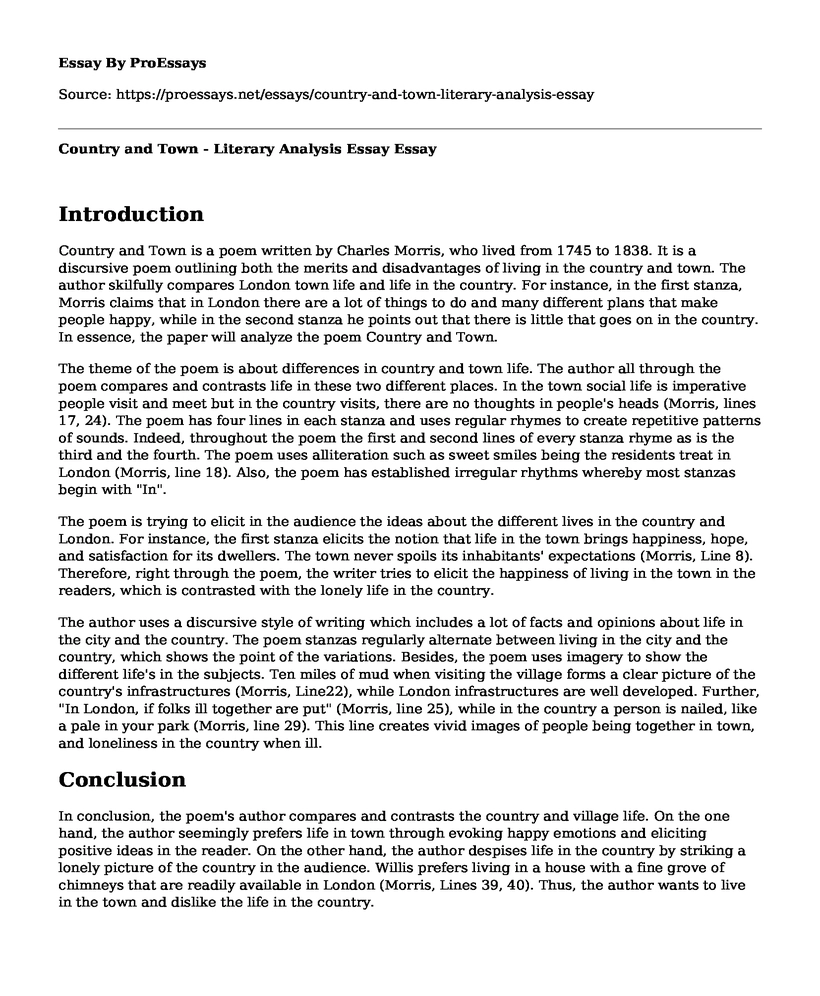Introduction
Country and Town is a poem written by Charles Morris, who lived from 1745 to 1838. It is a discursive poem outlining both the merits and disadvantages of living in the country and town. The author skilfully compares London town life and life in the country. For instance, in the first stanza, Morris claims that in London there are a lot of things to do and many different plans that make people happy, while in the second stanza he points out that there is little that goes on in the country. In essence, the paper will analyze the poem Country and Town.
The theme of the poem is about differences in country and town life. The author all through the poem compares and contrasts life in these two different places. In the town social life is imperative people visit and meet but in the country visits, there are no thoughts in people's heads (Morris, lines 17, 24). The poem has four lines in each stanza and uses regular rhymes to create repetitive patterns of sounds. Indeed, throughout the poem the first and second lines of every stanza rhyme as is the third and the fourth. The poem uses alliteration such as sweet smiles being the residents treat in London (Morris, line 18). Also, the poem has established irregular rhythms whereby most stanzas begin with "In".
The poem is trying to elicit in the audience the ideas about the different lives in the country and London. For instance, the first stanza elicits the notion that life in the town brings happiness, hope, and satisfaction for its dwellers. The town never spoils its inhabitants' expectations (Morris, Line 8). Therefore, right through the poem, the writer tries to elicit the happiness of living in the town in the readers, which is contrasted with the lonely life in the country.
The author uses a discursive style of writing which includes a lot of facts and opinions about life in the city and the country. The poem stanzas regularly alternate between living in the city and the country, which shows the point of the variations. Besides, the poem uses imagery to show the different life's in the subjects. Ten miles of mud when visiting the village forms a clear picture of the country's infrastructures (Morris, Line22), while London infrastructures are well developed. Further, "In London, if folks ill together are put" (Morris, line 25), while in the country a person is nailed, like a pale in your park (Morris, line 29). This line creates vivid images of people being together in town, and loneliness in the country when ill.
Conclusion
In conclusion, the poem's author compares and contrasts the country and village life. On the one hand, the author seemingly prefers life in town through evoking happy emotions and eliciting positive ideas in the reader. On the other hand, the author despises life in the country by striking a lonely picture of the country in the audience. Willis prefers living in a house with a fine grove of chimneys that are readily available in London (Morris, Lines 39, 40). Thus, the author wants to live in the town and dislike the life in the country.
Works Cited
Morris, Charles. “Country and Town”.
Cite this page
Country and Town - Literary Analysis Essay. (2023, Aug 14). Retrieved from https://proessays.net/essays/country-and-town-literary-analysis-essay
If you are the original author of this essay and no longer wish to have it published on the ProEssays website, please click below to request its removal:
- Research Paper Example on The Yellow Wallpapers by Charlotte Perkins
- Greek Mythology: Trojan War Essay Example
- Book Review on All Shook Up by Glenn C. Altschuler Paper Example
- Poetry Analysis Essay on The Love Song J. Alfred Prufrock
- Essay Sample on The Hour: Trapped Lives of Women in a Patriarchal Society
- Essay Example on Kubla Khan: Poem as Social Criticism by Samuel Taylor Coleridge
- Essay Example on Social Realism in Literature: Common People, Stories, and Places







